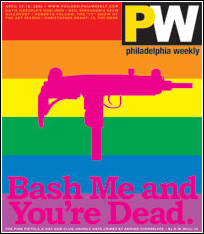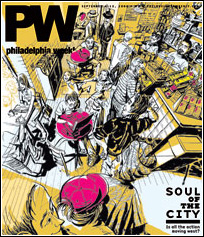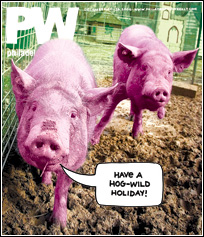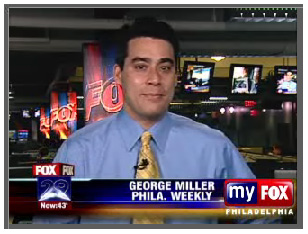Nerds for Nutter
Does the candidate's unlikely base predict race-blind elections for Philly's future?
From the March 28, 2007 Philadelphia Weekly
Most of the crowd has left the Old Pine Street Presbyterian Church after the evening's mayoral forum when a tiny elderly white woman approaches candidate Michael Nutter.
"Are you the one who voted for the casinos?" she meekly asks him.
With a smile, he curtly responds, "No."
Flustered, the woman tries to recall which candidate said what during the two-hour event sponsored by the Society Hill Civic Association and the Delaware River Neighborhood Alliance. She stumbles over her words, makes a few uncomfortable racial comments, and again says it was Nutter who approved the casino.
"I'm the shorter black guy," he returns in his nasal voice. "That was Dwight Evans who voted for the casinos. He's taller than me and has even less hair than I do."
***
With the exception of a few boos for Evans, who voted in favor of casino legislation as a state representative, the firmly anticasino audience politely applauded each of the five candidates in attendance after they spoke. The crusty, buttoned-down crowd of mostly gray-haired white people roared occasionally when a candidate spoke against the casinos. But it was otherwise a timid affair.
It should've been Nutter's night, and in reality, it probably was. The policy-spewing former city councilman who speaks like a droll mathematics professor appeals to the educated and white constituencies. And with Bob Brady possibly exiting the ballot due to petition challenges, Nutter may have the opportunity to garner even more of the white vote, insiders say.
The problem is that Nutter would only be padding his base, and that may not be enough.
"Nutter plays very well among those in tune - the younger, educated voters," says Dan Pohlig, a researcher and producer for the Next Mayor project, a multimedia effort designed to educate voters. "He's got that Jon Stewart, Daily Show-type wit. You have to know what he's talking about to get him sometimes."
The University of Pennsylvania Democrats, for example, endorsed Nutter last month.
"Michael Nutter's raw intelligence really shows in his crime plan," says Clayton Robinson, a Wharton sophomore who's president of the Penn Dems. "He has a record in the city, and that record stands for itself. For us, it's the plan and the man."
But the demographic that appreciates raw intelligence is small. Only 18 percent of Philadelphians hold a bachelor's degree.
"If you're going to rely on that base," says Pohlig, "you can't win."
***
Nutter's problem right now is that African-Americans don't seem to support him.
Congressman Chaka Fattah drew support from 27 percent of the 400 registered African-American Philadelphians The Philadelphia Tribune polled last week. Evans received support from 18 percent of those polled, and a quarter said they were undecided. Nutter received only 9 percent of the potential vote.
"He gave the mayor a rough time while he was in City Council, and people look down upon that," says Rev. Anthony Floyd, president and CEO of the Philadelphia Council of Clergy. "He's just arrogant. Michael Nutter is a standoffish person."
The Council of Clergy includes 500 ministers with a combined congregation reportedly around a half-million. They endorsed Brady.
"He would jump into a swimming pool for his people," Floyd says, fondly referring to Ed Rendell's old mayoral tradition of annually opening city pools by launching his large, hairy body into the water. "My folks love Brady."
***
Despite Floyd's mostly African-American contingent pulling for a Caucasian candidate this year, in recent mayoral elections, the voters tended to support people who look like themselves.
In the 2003 general election Democrat John Street was elected mayor over the white Republican candidate Sam Katz in a vote that followed racial lines. In predominantly black Strawberry Mansion, Street received more than 98 percent of the vote. In wards of the predominantly white Mayfair section, Katz received more than 87 percent of the vote. (Marty Weinberg, a white Democrat, drew nearly 78 percent of the vote in the same ward during the 1999 mayoral primary Street ultimately won.)
"People vote their race," says Milton Street, the political sideshow and former mayoral candidate who's now jockeying for an at-large City Council seat. "You may get 15 to 20 percent of whites who vote black, and 15 to 20 percent of blacks who vote white, but that's it."
Street says the three major African-American candidates are splitting the black vote.
"I don't disagree that that's a general perception among the insiders, but don't underestimate the voters," cautions Evans. "Give people more credit than that."
***
According to projected 2005 census figures, Philadelphia is about 45 percent African-American, 40 percent non-Hispanic white, 10 percent Hispanic and 5 percent Asian. No candidate will win an election relying upon a single demographic.
"Race doesn't matter to me," says Shirley Boggs, founder of Mothers United Through Tragedy, a support group for the families of murder victims. "It doesn't matter whether they're white, black, yellow or blue as long as they get the job done."
John Childress, executive director of the African American Chamber of Commerce, predicts a future when the mayoral campaign is more about economics and opportunities, and less about skin color.
"What I see is a more astute understanding of the city and an understanding of how everything is interconnected," he says, speaking about the relationships between crime, business, education and social services. "We won't see voting along racial lines eliminated entirely in this election, but we'll see it in the next."
The latest Keystone Poll, released in January, shows Nutter lagging with only 12 percent of the potential primary vote compared to frontrunner Fattah's 26 percent.
But 22 percent of the voters remain undecided, and all the candidates are dying to reach those people, regardless of their race or ethnicity.
Nutter says he won't pander to any specific demographic over the next two months.
"I campaign everywhere in the city of Philadelphia," he says. "I want everybody's vote."








